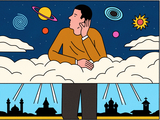my journey at UMBC learning the value of religion
Written by Sofia Encarnacion, ‘22 Mosaic Student Diversity and Inclusion Peer.
My parents, siblings, and I do not practice any religion, but my parents still had us go to church for the first few years of my life. When I got older, my dad explained his reasoning for attending as a way to “understand American culture.” It was a Presbyterian church, and I didn’t have any friends there. Later, when we stopped going, my eight-year-old self was just relieved I didn’t have to wake up so early. All my friends at school were some denomination of Protestant and they didn’t care that I wasn’t. In sixth grade, a classmate told me I was going to Hell for not believing in God, but that was it. Overall, religion wasn’t a huge part of my socialization or upbringing. However, I was grateful that I knew the more well-known stories in the Bible, as there were plenty of references to them in pop culture and English class.
My relationship with Christianity always felt conflicting. When I was ten, I saw a man on the news imply that the 2010 Haitian earthquake was deserved because they “made a pact with the devil.” That was my first distinct interaction of people using their faith as an excuse for hatred. Despite this, I knew my Christian friends were good people. I was now an outsider of this type of faith, and my interactions with my peers were stronger influences than some random televangelist or the anti-LGBTQ+ Christians I’d see on TV. However, I noticed I was still putting up walls around myself from embracing organized religion.
As I got older, I knew there were other religions, but I guess I never thought about them until I befriended a Muslim girl on my bus. Sixth graders can be very ignorant. Our bus ride was almost an hour long so we’d spend a lot of time talking. As soon as she told us the purpose of her hijab, all the girls were very protective whenever she’d occasionally duck down in the bus seat to fix it. Some boys would try to peek at her, and the girls would shove them away. We definitely asked dumb questions, such as “Don’t you get hot wearing it?” Thankfully, she was really patient with us.
Fast forward to high school, I attend a student-run TEDx event. My favorite talk was called “Yes, I Do Shower In It” by a hijabi girl. She talked about the meaning behind her hijab, and her experiences with anti-Muslim sentiment after 9/11. The talk stuck with me so much that I shared it with friends from my hometown. My reaction—besides admiration for this 16-year old’s wit and humor—was that I am very oblivious to how religion impacts people’s everyday lives.
When I entered UMBC, the prominence of religious beliefs were a major culture shock to me. Involvement Fest has dozens of religious organizations, over 40 in fact, and they were all pretty active. When I joined the student staff for Mosaic one of my coworkers often expressed his dedication to God. As for the hijabi girl who gave the TEDx talk back from high school, I ended up working with her as well in The Mosaic and we ended up becoming close friends. When I lived on campus, the girl I roomed with was a Quaker and I was able to learn about Quaker values and customs. She told me their meeting house was welcoming of all faiths, even atheists. As a result of her openness, I put down my walls around organized religion and felt a lot more comfortable. The process involved a lot of listening, Googling, and conversations with my peers. I couldn’t just admit I was ignorant, I had to make a conscious effort to continue educating myself and checking my implicit biases.
I do not deny that religion and spiritual beliefs can and have sometimes been used to oppress and exclude others. However, there is an evident sense of camaraderie in each of these religious organizations. From my experiences, each group encouraged community service. And the purpose of this volunteering wasn’t for a high school graduation requirement like much of the volunteering I had seen in my youth: it was solely for helping others less fortunate. I saw how faith was also a source of solace when tragedies struck their community. Especially now, religion offers hope when almost everything feels hopeless.
P.S.: The hijabi girl (her name is Tirzah Khan, she’s now one of my best friends) started a TEDx student org: TEDxUMBC. Check us out and follow our IG @tedxumbc.
I also encourage you all to check out our Interfaith Dialogue series session on October 27, 2020 where we will discuss the relationship between religious organizations and social change.
Posted: August 12, 2020, 11:36 AM
